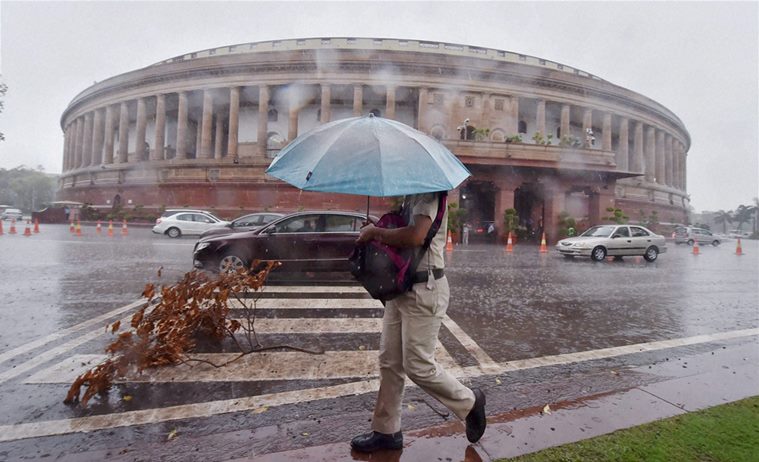Feature
Monsoon Session ends now, out of 25 only 9 bills passed by Houses

New Delhi: Very short session for just 19-day the Monsoon Session of Parliament concludes today. Both the Houses were expected to pass more than 25 bills on a range of subjects but only 9 bills were passed. The items on the government’s priority list were four Bills to replace Ordinances promulgated by the President during the inter-session period.
Three of these were related to the Goods and Services Tax regime; one was on the stressed assets of banks. Parliament, however, had limited time to scrutinise the government’s legislative agenda, and to discuss significant national issues.
Disruptions of the proceedings reduced the time available for deliberation. Both Houses tried to make up for lost time by sitting beyond their scheduled hours, but still fell short. Lok Sabha worked for approximately 70% of its scheduled time, and Rajya Sabha for about 73%.
The available time was also reduced due to the adjournment of both Houses in memory of sitting members who had passed away. Lok Sabha did not take up any business on two days (in memory of Vinod Khanna and Sanwar Lal Jat); Rajya Sabha did not function on the first day of the session as a mark of respect to Anil Madhav Dave, Minister of State for Environment, who passed away in May.
Lok Sabha spent 28 hours, Rajya Sabha 22 hours, discussing Bills. The government’s legislative agenda sailed smoothly through Lok Sabha. Two Bills extending the GST regime to Jammu and Kashmir were among the 13 that were passed. The Lower House also passed a Bill giving the country’s 20 IIMs the status of institutes of national importance and the power to award degrees.
Among the Bills that witnessed a spirited debate in both Houses was the Banking Regulation (Amendment) Bill, an attempt by the government to address the issue of rising corporate loan defaults. The Bill authorises the Reserve Bank of India to give directions to banks on recovering these loans.
During the debate, MPs questioned the rationale of having RBI intervene in the day-to-day working of banks. Rajya Sabha passed the Bill on Wednesday.
In all, however, only seven Bills were approved by the Upper House. The government was also unable to secure the passage of a key clause in The Constitution (123rd Amendment) Bill, which gives the National Commission on Backward Classes (NCBC) constitutional status.
As reported in media, the main clause of the Bill which dealt with the composition of the NCBC, had to be dropped due to the absence of enough ruling party members in the Upper House.
National issues also resonated in Parliament. Approximately 55 hours were devoted to discussing the agrarian crisis, suicides by farmers, floods, mob violence, lynching, and atrocities on Dalits and minorities in both Houses.
Rajya Sabha also discussed for more than five hours the country’s foreign policy and strategic ties with its neighbours. Question Hour was suspended in both Houses to discuss the 75th anniversary of the Quit India Movement. Both Houses passed a resolution pledging the building of a better India.
The Session has not been free from controversy. The Speaker suspended five MPs for persistently and wilfully obstructing the proceedings of Lok Sabha.
Early on in the session, Rajya Sabha had to be adjourned because of lack of quorum in the House. On Wednesday, the government introduced the Code on Wages Bill at short notice and referred it to a Joint Committee of both Houses. This prompted protests from MPs who complained that they did not get the time to study the Bill, and that the reference to a Joint Committee would bypass scrutiny of the Bill by the Parliamentary Committee on Finance.
Entertainment
Meghalaya Reserves Legalized Gambling and Sports Betting for Tourists

The State Scores Extra High on Gaming-Friendly Industry Index
Meghalaya scored 92.85 out of 100 possible points in a Gaming Industry Index and proved to be India’s most gaming-friendly state following its recent profound legislation changes over the field allowing land-based and online gaming, including games of chance, under a licensing regime.
The index by the UK India Business Council (UKIBC) uses a scale of 0 to 100 to measure the level of legalisation on gambling and betting achieved by a state based on the scores over a set of seven different games – lottery, horse racing, betting on sports, poker, rummy, casino and fantasy sports
Starting from February last year, Meghalaya became the third state in India’s northeast to legalise gambling and betting after Sikkim and Nagaland. After consultations with the UKIBC, the state proceeded with the adoption of the Meghalaya Regulation of Gaming Act, 2021 and the nullification of the Meghalaya Prevention of Gambling Act, 1970. Subsequently in December, the Meghalaya Regulation of Gaming Rules, 2021 were notified and came into force.
All for the Tourists
The move to legalise and license various forms of offline and online betting and gambling in Meghalaya is aimed at boosting tourism and creating jobs, and altogether raising taxation revenues for the northeastern state. At the same time, the opportunities to bet and gamble legally will be reserved only for tourists and visitors.
“We came out with a Gaming Act and subsequently framed the Regulation of Gaming Rules, 2021. The government will accordingly issue licenses to operate games of skill and chance, both online and offline,” said James P. K. Sangma, Meghalaya State Law and Taxation Minister speaking in the capital city of Shillong. “But the legalized gambling and gaming will only be for tourists and not residents of Meghalaya,” he continued.
To be allowed to play, tourists and people visiting the state for work or business purposes will have to prove their non-resident status by presenting appropriate documents, in a process similar to a bank KYC (Know Your Customer) procedure.
Meghalaya Reaches Out to a Vast Market
With 140 millions of people in India estimated to bet regularly on sports, and a total of 370 million desi bettors around prominent sporting events, as per data from one of the latest reports by Esse N Videri, Meghalaya is set to reach out and take a piece of a vast market.
Estimates on the financial value of India’s sports betting market, combined across all types of offline channels and online sports and cricket predictions and betting platforms, speak about amounts between $130 and $150 billion (roughly between ₹9.7 and ₹11.5 lakh crore).
Andhra Pradesh, Telangana and Delhi are shown to deliver the highest number of bettors and Meghalaya can count on substantial tourists flow from their betting circles. The sports betting communities of Karnataka, Maharashtra, Uttar Pradesh and Haryana are also not to be underestimated.
Among the sports, cricket is most popular, registering 68 percent of the total bet count analyzed by Esse N Videri. Football takes second position with 11 percent of the bets, followed by betting on FIFA at 7 percent and on eCricket at 5 percent. The last position in the Top 5 of popular sports for betting in India is taken by tennis with 3 percent of the bet count.
Local Citizens will Still have Their Teer Betting
Meghalaya residents will still be permitted to participate in teer betting over arrow-shooting results. Teer is a traditional method of gambling, somewhat similar to a lottery draw, and held under the rules of the Meghalaya Regulation of the Game of Arrow Shooting and the Sale of Teer Tickets Act, 2018.
Teer includes bettors wagering on the number of arrows that reach the target which is placed about 50 meters away from a team of 20 archers positioned in a semicircle.
The archers shoot volleys of arrows at the target for ten minutes, and players place their bets choosing a number between 0 and 99 trying to guess the last two digits of the number of arrows that successfully pierce the target.
If, for example, the number of hits is 256, anyone who has bet on 56 wins an amount eight times bigger than their wager.

























